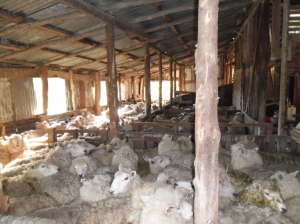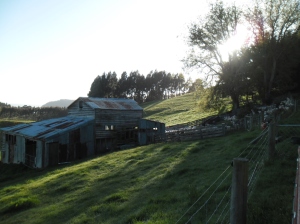Bah Humbug
by Kit Munro
I will honour Christmas in my heart, and try to keep it all the year.
It was another day of shearing, this time for Scarfie Shearing, a little contracting business I have. Not only do I shear sheep on the family farm, but very occasionally I shear sheep for money.
Scarfie Shearing mostly operates on the coast at a place called Waitati and inland on the Taieri Plain.
Quite often it is shearing the sheep out in the paddock with a portable machine. Although occasionally I have to use blades, as I did the other day, when there was a fairly major breakdown.
The place I was working at this day has an old woolshed and had about 250 sheep to shear; ewes and lambs.
It was great fun, the locals are funny as, and while the shed is only hanging together by memory I have worked in rougher.
I yarned quite a bit of the day while I worked, My rouseabout, a cheeky chap called Hiata, at one point opined that “it must be hard on you shearers y’know”. I asked him why he thought that and he said “cause you can’t talk about your feelings”. I told him that I had feelings almost every other day and was more than happy to talk about them.
When I wasn’t getting all emotional on it and yarning I listened to A Christmas Carol by Charles Dickens. Despite it being probably the worst time of year to listen to it…
The descriptions of London winter did something to alleviate the heat of the woolshed on a summers day. If nothing else A Christmas Carol is Dickens at his best. A Christmas Carol has been quoted to death but here are a two that jumped out at me.
I have seen your nobler aspirations fall off, one by one, until the master passion, Gain, engrosses you.
and…
Oh, a wonderful pudding! Bob Cratchit said, and calmly too, that he regarded it as the greatest success achieved by Mrs. Cratchit since their marriage. Mrs. Cratchit said that now the weight was off her mind, she would confess she had had her doubts about the quantity of flour. Everybody had something to say about it, but nobody said or thought it was at all a small pudding for a large family. It would have been flat heresy to do so. Any Cratchit would have blushed to hint at such a thing.
I found my copy of A Christmas Carol by Charles Dickens here.




























